Ice hockey is a dynamic and complex sport, making score prediction particular challenging due to the interplay of multiple factors. These factors include team performance, player statistics, and coaching techniques, among others. Understanding how each of these elements contributes to score prediction can make it easier to forecast games. This article will focus on the specific role coaching strategies play in predicting ice hockey scores. But first, let’s take a brief look at what coaching strategies actually entail.
Contents
Understanding Coaching Strategies for Predicting Ice Hockey Scores
In ice hockey, coaching strategies are the tactical plans that coaches create to lead their teams to victory. These plans might include game plans, in-game revisions, and particular tactical choices. Good coaching techniques are essential for improving team performance and can significantly affect how games turn out.
The three main coaching tactics that coaches use are goaltender management, offensive strategy, and defensive strategy. A few examples of offensive strategies are power plays, zone entrances, and offensive zone sets. Defensive tactics include matchup choices, penalty killing, and defensive zone coverage. Because coaching techniques are so vital in determining how games turn out, they need to be modified continuously to fit the needs of a changing game.
The Role of Coaching Strategies in Predicting Ice Hockey Score
Here are quantitative and qualitative analyses of coaching tactics used for predicting ice hockey scores by forecasters such as The Sports Prophets.
Quantitative analysis
In quantitative analysis, the impact of coaching strategies on ice hockey game results is evaluated using statistical methods. Common techniques include performance metrics, advanced analytics, matchup analysis, and in-game adjustments.
Performance metrics involve tracking the number of goals scored and conceded before and after applying specific coaching tactics. Advanced statistics such as Corsi, Fenwick, and Expected Goals (xG) are used for deeper insights. Additionally, analyzing line performances helps determine how different line combinations influence scored and avoided.
Qualitative analysis
Two key metrics for qualitative analysis are observational data and expert opinions. Expert insights provide valuable perspectives on how coaching tactics affect game results from the viewpoints of players, analysts, and coaches. The coach’s perspective, in particular, sheds light on the rationale behind specific decisions and their effect on team performance. This is typically achieved through firsthand accounts of strategy development and its intended impact on the game.
Commentators and analysts offer detailed evaluations of coaching techniques both during and after games. Their insights help in understanding the effectiveness of these tactics and their impact on game outcomes. Similarly, players provide a unique perspective on how coaching strategies affect team dynamics and their individual performance, explaining how these strategies influence their gameplay and overall game plan.
Observational data also reveals patterns and trends in how coaching techniques influence game flow, such as momentum shifts or changes in scoring patterns following strategic alterations.
Conclusion
This article explores both quantitative and qualitative evaluations of how coaching techniques impact the prediction of ice hockey outcomes, with a focus on understanding coaching strategies. Having a thorough grasp of these strategies makes it easier to predict ice hockey scores accurately.

